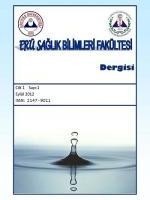BİPOLAR AFFEKTİF BOZUKLUĞU OLAN HASTALARA BAKIM VERENLERİN YAŞADIKLARI SORUNLAR VE BU SORUNLARLA BAŞETME DURUMLARI
Genel Bilgi: Bipolar bozukluk tanısı alan hastalara bakım verenler çeşitli problemler yaşamaktadırlar.
Anahtar Kelimeler:
Bipolar affektif bozukluk, aile, baş etme, hemşirelik
THE PROBLEMS OF CAREGIVERS IN BIPOLAR DISORDER
Background: The caregivers of patients with bipolar disorder had experienced various problems.Objective: This study was conducted to determination the problems experienced by the caregivers of patients with bipolar disorder and of cases of coping with these problems as a descriptive one.Method: The study was conducted with 76 individuals who has taken the responsibility of patients of University Hospital Psychiatry Polyclinic and which were diagnosed with BD the data was collected through a questionnaire prepared by the researchers and the chi-square test was used for statistical evaluation.Results: It has been seen that 68.4% of caregivers' need knowledge support and 64.5% percent need care support in this study. Individuals who provide care 36.8% physically, 90.8% affected by mental health and 50% were unable to perform self-care due to their jobs. In addition, according to the testimonies of family communication of 60.5%, social relations of 55.3% and, economic situation of 63.2% of the subjects were affected because of their professions.Conclusion: According to the results of the study, training for caregivers of patients who have BD, development for caregiver coping strategies and, caregiver support by home care services are offered.
Keywords:
Bipolar Disorder, Caregiver, to Cope with, Nursing,
___
- Arkar H, Eker D. Akıl hastalıkları ile ilgili tutumlar: Verilen neden tipinin etkisi. Turk Psikiyatri Derg 1996; 7(3): 191-97.
- Ateşçi FÇ, Karadağ F, Özdel O, ve ark. Bipolar ve yineleyici major depresif bozuklukların klinik özellikleri: Karşılaştırmalı bir çalışma. Türkiye’ de Psikiyatri 2001; 3(2):95-102.
- Buldukoğlu K, Tel H (a). Psikiyatri kliniğinde yatan psikotik hasta ailelerinin hasta ve hastalığa karşı tutum ve yaklaşımları, III. Ulusal Hemşirelik Kongresi: 24-26 Haziran 1992-Sivas: (s. 574-580). Sivas.
- Buldukoğlu K, Tel H (b). Psikotik bozuklukların neden olduğu sosyal ve ekonomik kayıplar. III. Ulusal Hemşirelik Kongresi: 24-26 Haziran 1992-Sivas: (s.581-586). Sivas.
- Doornbos MM. The problems and coping methods of caregivers of young adulth with mental illness. J Psychosoc Nurs Ment Health Serv 1997; 35(9): 22- 6.
- Goetzel RZ, Hawkins K, Wang S. The health and productivity cost burden of the “Top 10” physical and mental health conditions affecting six large US employers in 19 J Occup Environ Med 2003; 45(1): 5–
- Gülseren L, Coşkun, S, Gülseren Ş, ve ark. Şizofreni ve bipolar tanısı konan hastalar ile ailelerinde aile işlevleri üzerine karşılaştırmalı bir çalışma. 3P Dergisi 1999; 7(1):23-31.
- Karataş N. Araştırmada örnekleme. Erefe İ, ed. Hemşirelikte Araştırma İlke Süreç ve Yöntemler. İstanbul: Odak Ofset; 2002: 125Kum N. Psikiyatri Hemşireliği El Kitabı.
- İstanbul: Vehbi Koç Vakfı Yayınları No:13; 1996: 1-33.
- Magliano L, Orrico A, Fiorillo A, et al. Family burden in bipolar disorders: results from the Italian Mood Disorders Study (IMDS). Epidemiol Psichiatr Soc 2009; 18(2):137- 46.
- Maji R, Sood M, Sagar R, et al. A followup study of family burden in patients with bipolar disorder. Int J Soc Psychiatry 2012; 58(2):217- 23.
- Merikangas KR, Pato M. Recent developments in the epidemiology of bipolar disorder in adults and children: magnitude, correlates, and future directions. Clin Psychol Sci Pract 2009; 16(2):121- 33.
- Norbeck JS, Charftez L, Skodol-Wilson, H et al. Social support needs of family caregivers of psychiatric patients from three age groups. Nurs Res. 1991; 40(4): 208
- Oflaz F. Psikiyatrik Hastaların Eşlerinin Psikososyal Güçlükleri ve Stresle Baş Etme Yollarının İncelenmesi. Yüksek Lisans Tezi, GATA Sağlık Bilimleri Enstitüsü, Ankara,1995.
- Özaltın G. Psikiyatri hemşireliğinde hasta ve hasta aileleri. Cumhuriyet Üniversitesi Hemşirelik Yüksek Okulu Dergisi 1999; 3(1):1-7.
- Polat A, Üçok A, Genç A, ve ark. Ruhsal hastalığı olan kişilerin ailelerinde stigma, Ulusal Psikiyatri Kongresi: 3-7 Ekim 2000-Antalya: Bildiriler (s.339-340). Antalya.
- Pollio DE, North CS, Osborne V, et al. The impact of psychiatric diagnosis and family system relationship on problems identified by families coping with a mentally III member. Fam Process 2001; 40(2): 19920
- Rose L. Benefits and limitations of professional family interactions: The perspective. Arch Psychiatr Nurs 1998; 12(3):140- 47.
- Scholler-Jaquish A. Persons with chronic mental illness. Fortinash KM, HolodayWorret PA, ed. Psychiatric Mental Health Nursing. St. Louis. Missouri: Mosby Company; 1996: 685-709.
- Smith-Dijulio, K. Families in crisis: Family violence: Foundations of Psychiatric Mental Health Nursing, 3th ed, Varcarolis EM ed. Philadelphia: Sounders Company pres; 1998: 387-416.
- Solomon P, Draine J. Adaptive coping among family members of persons with serious mental illness. Psychiatr Serv 1995; 46(11): 1156- 60.
- Taktak Ş, Erkıran M, Karşıdağ Ç, ve ark. Şizofren olgularda aile işlevselliğinin algılanması, sosyodemografik ve klinik özellikle ilişkisi üzerine bir çalışma. Düşünen Adam 2000; 13(4):196-203.
- Tel H, Terakye G. Şizofrenik hasta ailelerine yönelik bir psikoeğitimsel yaklaşım uygulaması denemesi. Anadolu Psikiyatri Dergisi 2000; 1(3):133- 42.
- Uğur M. Mizaç bozuklukları. İlkay E, ed. Cerrahpaşa Psikiyatri. İstanbul: İstanbul Üniversitesi Rektörlük Yayın No:240, İstanbul Üniversitesi Basım ve Yayınevi Müdürlüğü; 2002: 391-452.
- Ünal G. Bipolar Affektif Bozukluğu Olan Hastaların Aile İşlevlerinin Değerlendirilmesi. Yüksek Lisans Tezi, Ege Üniversitesi Sağlık Bilimleri Enstitüsü, İzmir,1998.
- Yurtsever ÜE. Bipolar Bozukluğu Olan Hasta ve Ailelerin Ele Alınışında Yapılandırılmış Psikoeğitimsel Yaklaşımlar. Yüksek Lisans Tezi, Marmara Üniversitesi, Eğitim Bilimleri Enstitüsü, İstanbul, 1999.
- Yayın Aralığı: Yılda 2 Sayı
- Başlangıç: 2012
- Yayıncı: Erciyes Üniversitesi
Sayıdaki Diğer Makaleler
KLİMAKTERİK DÖNEMDE YAŞANAN SEMPTOMLAR VE HEMŞİRENİN ROLÜ
Aslı SİS ÇELİK, Türkan PASİNLİOĞLU
KAVRAM HARİTASININ ÖĞRENCİ EĞİTİMİNDE KULLANIMINA BİR ÖRNEK: TİP 1 DİABETES MELLİTUS
Nevin USLU, Zübeyde KORKMAZ, Öznur TOSUN, Özlem AVCI, Meral BAYAT, Emine ERDEM
Sibel ARGUVANLI ÇOBAN, Sultan TAŞCI
14 YAŞ VE ÜZERİ BİREYLERİN ANKSİYETE VE GENEL SAĞLIK DÜZEYLERİNİN BELİRLENMESİ
Birgül ÖZKAN, Sibel ARGUVANLI, Zeliha KAYA ERTEN, E.ümit SEVİĞ
DİABETES MELLİTUS'UN TIBBİ BESLENME TEDAVİSİNDE YAĞLI TOHUMLARIN KULLANIMI
ONKOLOJİDE SEMPTOM YÖNETİMİNDE KULLANILAN KANIT TEMELLİ TAMAMLAYICI YÖNTEMLER VE ETKİLERİ
KRONİK HASTALIKLARDA PSİKOSOSYAL SORUNLAR VE BAKIM
ÇOCUK YUVASINDA KALAN ÇOCUKLARIN FİZİKSEL SORUNLARININ BELİRLENMESİ
